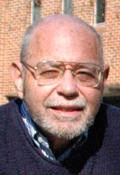Paul Gottfried
| Paul Edward Gottfried | |
|---|---|

Paul E. Gottfried
|
|
| Born | November 21, 1941 (age 75) |
| Era | Contemporary philosophy |
| Region | Western Philosophy |
| School | Paleoconservatism |
|
Main interests
|
Welfare state, democratic pluralism, Romanticism |
Paul Edward Gottfried (born November 21, 1941) is an American paleoconservative political philosopher, intellectual historian, columnist and former Horace Raffensperger Professor of Humanities at Elizabethtown College in Elizabethtown, Pennsylvania, as well as a Guggenheim recipient. He is currently H. L. Mencken Club President.
Gottfried was born in The Bronx in 1941. His father was a successful furrier from Budapest, who had fled Hungary after the July Putsch of 1934. The family moved to Bridgeport shortly after his birth. Gottfried attended Yeshiva University in New York as an undergraduate and returned to Connecticut to attend Yale. He belonged to the Yale Political Union’s Party of the Right.
He is the author of numerous books and articles detailing the influences which various German thinkers (such as Hegel and Schelling) have exerted on American conservative political theory, and was a friend of many political and intellectual figures: such as Richard Nixon, Pat Buchanan, John Lukacs, Thomas Molnar, Will Herberg, Samuel T. Francis, Paul Piccone, Murray Rothbard, Eugene Genovese, Christopher Lasch, and Robert Nisbet. Gottfried is a paleoconservative critic of neoconservativism within the Republican Party. In fact, the term paleoconservative was first used by Paul Gottfried and Thomas Fleming, with the "paleo" prefix meaning "old" in opposition to the "neo", or "new", conservatives. Gottfried is also notable as the first person to use the term "alternative right", when referring specifically to developments within American right-wing politics, in 2008. The term has since gained wide currency with the rise of the so-called "alt-right".
...
Wikipedia
